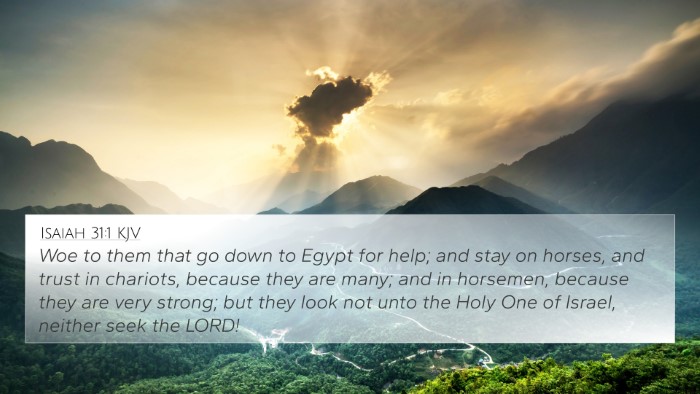Understanding 2 Chronicles 16:7
Verse: “And at that time Hanani the seer came to Asa king of Judah, and said unto him, Because thou hast relied on the king of Syria, and not relied on the LORD thy God, therefore is the host of the king of Syria escaped out of thine hand.” (2 Chronicles 16:7)
Summary of Verse Meaning
In this verse, the prophet Hanani delivers a message from God to King Asa of Judah, reprimanding him for relying on foreign alliances instead of trusting the Lord for help. Asa had turned to the king of Syria for military support against Israel, abandoning the faith he had previously shown in God. This passage serves as a warning about the dangers of misplaced trust and highlights the consequences of not depending on divine assistance.
Insights from Commentaries
Matthew Henry's Commentary
Henry emphasizes that Asa, despite his earlier devotion to God, faltered by seeking help through human means rather than divine. His reliance on Syria marked a significant spiritual decline. Henry points out that trusting in God should be evident, especially during trials, as He alone can provide true deliverance. The seer’s message was both a rebuke and a reminder of God’s previous interventions in Asa’s life.
Albert Barnes' Notes
Barnes highlights that the prophet Hanani's intervention illustrates God's willingness to send warnings and corrections through His prophets. The verse illustrates that Asa's actions had serious ramifications, leading to a missed opportunity for victory against the Syrians. Barnes notes that God's commands are often accompanied by consequences when ignored, emphasizing the need for faithfulness among leaders and individuals alike.
Adam Clarke's Commentary
Clarke discusses the nature of prophecy in this context and underscores the importance of seeking God’s counsel rather than alternative solutions. He remarks on Asa’s tendency to forget past victories accomplished through divine intervention. Clarke warns that when people trust in worldly powers rather than the spiritual authority of God, they ultimately put themselves at risk of losing divine favor and assistance.
Bible Cross-References
This verse can be connected to several other biblical passages that reflect similar themes of trust, faith, and the consequences of turning away from God:
- Proverbs 3:5-6: "Trust in the LORD with all thine heart; and lean not unto thine own understanding."
- Isaiah 31:1: "Woe to them that go down to Egypt for help; and stay on horses..."
- 2 Chronicles 20:12: "O our God, will You not judge them? For we have no power against this great multitude that is coming against us; nor do we know what to do, but our eyes are upon You."
- Psalm 20:7: "Some trust in chariots, and some in horses: but we will remember the name of the LORD our God."
- Matthew 6:33: "But seek ye first the kingdom of God, and his righteousness; and all these things shall be added unto you."
- Hebrews 11:6: "But without faith it is impossible to please Him: for he that cometh to God must believe that He is..."
- Jeremiah 17:5: "Thus saith the LORD; Cursed be the man that trusteth in man, and maketh flesh his arm..."
Application and Reflection
The lesson from 2 Chronicles 16:7 serves as a powerful reminder about where to place our trust in times of difficulty. It encourages believers to seek God's guidance and strength, reflecting on the numerous instances in which He has provided assistance. By cross-referencing this verse with others, we can form a more complete understanding of God’s expectations and the invitation to rely on Him completely.
Thematic Connections
This verse is deeply interconnected with others that illustrate God’s faithfulness and the disastrous consequences of turning away from Him. We can observe thematic ties through:
- Prophetic Warnings: The consistent theme of prophets calling the people back to trust in God.
- Consequences of Disobedience: A clear warning that actions taken in reliance on worldly alliances can lead to tragic results.
- God's Sovereignty: Reinforcement of the notion that God is ultimately in control and capable of delivering His people in all circumstances.
Conclusion
2 Chronicles 16:7 serves not only as a historical account but also as a profound teaching on reliance on God versus human means. Through a comparative analysis of this and related verses, believers gain a deeper insight into the nature of faith and the importance of trust in God’s plans. The collective wisdom found in scripture exhorts us to assess where our reliance lies and invites us into a robust relationship with God characterized by unwavering trust and faith.














